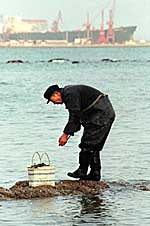




China’s biggest oil discovery in decades may not reduce its dependence on imports, experts say.
On May 3, China National Petroleum Corp. (CNPC) announced it had found an oil field with one billion tons of reserves in the shallow waters of Bohai Bay on the coast of Hebei province, state media reported.
The Nanpu block of the Jidong field contains the equivalent of more than 7.3 billion barrels of oil, making it China’s largest discovery in more than 40 years, CNPC said.
That would be enough to satisfy China’s oil demand, including what is now met by imports, for more than three years, the official Xinhua news agency reported.
But in an interview with Radio Free Asia, Philip Andrews-Speed, a China energy expert at Scotland’s University of Dundee in Edinburgh, said the Nanpu field isn't big enough to satisfy China’s energy needs or end its import dependence.
When it comes on production in maybe three or four years’ time, [the field is] likely to account for 1 percent or less of China’s total consumption.
Usually, only a fraction of an oil field’s total reserves are considered recoverable, Andrews-Speed said.
“When it comes on production in maybe three or four years’ time, [the field is] likely to account for 1 percent or less of China’s total consumption. So, it’s nice for the company, it’s good news, but it doesn’t change anything for the country.”
China’s growth in demand may also easily exceed the field’s eventual output, Andrews-Speed said.
Andrews-Speed added that “what will be interesting is to what extent there is more potential for such discoveries. And I think one has to note that this is in shallow-water Bohai, just a few meters of water, which is technically difficult to work in.”
“And thus, the Chinese only in recent years have started to explore this strip of water around the Bohai Sea. And the question is, ‘Are there a few more of these [fields] to be found?’”
Robert Ebel, chairman of the energy program at the Washington-based Center for Strategic and International Studies, agreed that the discovery’s significance would depend on whether it turns out to be the first of many.
“I’m sure that they would like more discoveries,” said Ebel. “They would like to contain their dependence on imports, which is approaching 50 percent now. But their consumption is growing so rapidly that they’ve got to have a couple of discoveries every year to show any effort to reduce their dependence on imports.”
Ebel said the new field may help only to make up for declining production at China’s oldest major domestic resource, the Daqing oil field, where output has been falling for years.
Initial reports of big discoveries should always be viewed with skepticism until international audits confirm estimates of how much oil can actually be recovered, Ebel said.
“I always wonder about these early reports with regard to discoveries. Sometimes they never play out.”
Original reporting by Michael Lelyveld. Edited for the Web by Richard Finney.